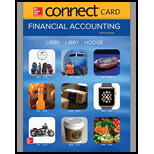
Determining Financial Statement Effects of an Asset Acquisition and
LO8-2, 8-3 Steve’s Outdoor Company purchased a new delivery van on January 1 for $45,000 plus $3,800 in sales tax. The company paid $12,800 cash on the van (including the sales tax), with the $36,000 balance on credit at 8 percent interest due in nine months (on September 30). On January 2, the company paid cash of $700 to have the company name and logo painted on the van. On September 30, the company paid the balance due on the van plus the interest. On December 31 (the end of the accounting period), Steve’s Outdoor recorded depreciation on the van using the straight-line method with an estimated useful life of 5 years and an estimated residual value of $4,500.
Required (round all amounts to the nearest dollar):
- 1. Indicate the effects (accounts, amounts, and + or −) of each transaction (on January 1, 2, and September 30) on the
accounting equation. Use the following schedule:
| Date | Assets | = | Liabilities | + | Stockholders’ Equity |
- 2. Compute the acquisition cost of the van.
- 3. Compute the depreciation expense to be reported for Year 1.
- 4. What impact does the interest paid on the 8 percent note have on the cost of the van? Under what circumstances can interest expense be included in acquisition cost?
- 5. What would be the net book value of the van at the end of Year 2?
Want to see the full answer?
Check out a sample textbook solution
Chapter 8 Solutions
Connect Access Card for Financial Accounting
 College Accounting (Book Only): A Career ApproachAccountingISBN:9781337280570Author:Scott, Cathy J.Publisher:South-Western College PubPrinciples of Accounting Volume 1AccountingISBN:9781947172685Author:OpenStaxPublisher:OpenStax College
College Accounting (Book Only): A Career ApproachAccountingISBN:9781337280570Author:Scott, Cathy J.Publisher:South-Western College PubPrinciples of Accounting Volume 1AccountingISBN:9781947172685Author:OpenStaxPublisher:OpenStax College College Accounting, Chapters 1-27AccountingISBN:9781337794756Author:HEINTZ, James A.Publisher:Cengage Learning,
College Accounting, Chapters 1-27AccountingISBN:9781337794756Author:HEINTZ, James A.Publisher:Cengage Learning,





